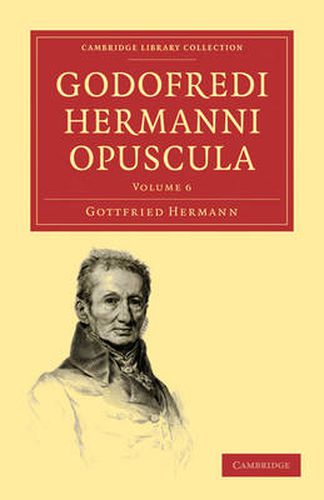Readings Newsletter
Become a Readings Member to make your shopping experience even easier.
Sign in or sign up for free!
You’re not far away from qualifying for FREE standard shipping within Australia
You’ve qualified for FREE standard shipping within Australia
The cart is loading…






Gottfried Hermann’s Opuscula (1827-1877) collects in eight volumes the shorter writings of this central figure of nineteenth-century classical philology. Best known for his work on Greek metrics and his editions of Aeschylus, Euripides and others, Hermann (1772-1848) drew on Kantian phenomenology as well as his own formidable understanding of ancient grammars to advance a compelling program of classical scholarship that took language itself as the primary witness to the distant past. Hermann’s grammar-based scholarship drew criticism, but established him as foundational to modern philology. As Sihler wrote in 1933, ‘He accepted nothing on mere authority, but investigated the causes and roots of every matter.’ Volume 6 (1835) includes Hermann’s German essays on Pindar, and on English scholarship on Greek poetry, as well as a Greek text with German translation of Aeschylus’ Eumenides. This diverse collection provides fuller insight into the mind of this highly influential scholar.
$9.00 standard shipping within Australia
FREE standard shipping within Australia for orders over $100.00
Express & International shipping calculated at checkout
Gottfried Hermann’s Opuscula (1827-1877) collects in eight volumes the shorter writings of this central figure of nineteenth-century classical philology. Best known for his work on Greek metrics and his editions of Aeschylus, Euripides and others, Hermann (1772-1848) drew on Kantian phenomenology as well as his own formidable understanding of ancient grammars to advance a compelling program of classical scholarship that took language itself as the primary witness to the distant past. Hermann’s grammar-based scholarship drew criticism, but established him as foundational to modern philology. As Sihler wrote in 1933, ‘He accepted nothing on mere authority, but investigated the causes and roots of every matter.’ Volume 6 (1835) includes Hermann’s German essays on Pindar, and on English scholarship on Greek poetry, as well as a Greek text with German translation of Aeschylus’ Eumenides. This diverse collection provides fuller insight into the mind of this highly influential scholar.